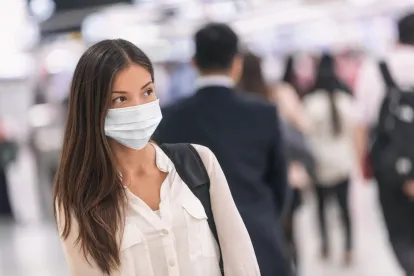As we previously reported, New York City is now mandating COVID-19 vaccination for workers and patrons of indoor dining, indoor fitness, and indoor entertainment venues and performances. Mayor Bill de Blasio has issued an Executive Order and additional guidance has been released on the mandate – termed the “Key to NYC” – which takes effect on August 17, 2021 (though enforcement will not begin until September 13, 2021). The following are some key highlights from the Executive Order and additional guidance.
Entities and Persons Covered by the Mandate
Under the mandate, both patrons and staff (including full- or part-time employees, interns, volunteers, and contractors) age 12 and older will be required to show proof they have received at least one dose of a COVID-19 vaccine authorized for emergency use by the U.S. Food and Drug Administration (FDA) or World Health Organization (WHO) in order to enter, patronize, attend an event at, or perform services in or for a covered indoor dining, indoor fitness, and indoor entertainment business or facility.
Covered entities do not need to check proof of vaccination for: individuals making deliveries or pickups; individuals who enter the establishment solely for the purpose of making necessary repairs; or gig workers picking up items such as food for takeout or delivery. However, such individuals must wear a face mask whenever they are unable to maintain six feet of social distance from other people in the business or facility. Similarly, individuals under the age of 12 may enter covered businesses and facilities so long as they wear a face mask, except when eating and drinking, whenever they are unable to maintain six feet of social distance from other people.
“Indoor dining” is defined as including:
-
indoor portions of food service establishments offering food and drink, including all indoor dining areas of food service establishments that receive letter grades pursuant to the NYC health code;
-
businesses operating indoor seating areas of food courts;
-
catering food service establishments that provide food indoors on its premises; and
-
any indoor portions of food service establishment that is regulated by the New York State Department of Agriculture and Markets offering food for on-premises indoor consumption.
Indoor dining does not include any food service establishment offering food and/or drinks exclusively for take-out, delivery or outdoor consumption, or providing charitable food services such as soup kitchens. If an establishment offers only take-out, delivery or outdoor dining, any indoor tables, chairs, or other furnishings normally used by patrons for indoor dining must be removed or blocked off (e.g., with signs or tape) so they are unavailable for use.
“Indoor fitness” is defined as including indoor portions of: standalone and hotel gyms and fitness centers; gyms and fitness centers in higher education institutions; yoga/Pilates/barre/dance studios; boxing/kickboxing gyms; fitness boot camps; indoor pools; CrossFit or other plyometric boxes; and other facilities used for conducting group fitness classes (defined as two (2) or more participants led by an instructor).
“Indoor entertainment” is defined as including indoor portions of the following locations, regardless of the activity at such locations: movie theaters; music or concert venues; adult entertainment, casinos, botanical gardens, commercial event and party venues, museums and galleries, aquariums, zoos, professional sports arenas and indoor stadiums, convention centers and exhibition halls, performing arts theaters, bowling alleys, arcades, indoor play areas, pool and billiard halls, and other recreational game centers.
Indoor dining, fitness, and entertainment facilities located in the following settings are exempted from the mandate:
-
private residential buildings when those settings are available only to residents;
-
office buildings when those settings are available only to office staff;
-
pre-K through grade 12 schools and child care programs; and
-
senior centers and community centers.
Exceptions to the Requirement to Show Proof of Vaccination
There are some exceptions to the requirement to show proof of vaccination at an otherwise covered business or facility as follows:
-
individuals entering a covered location for a quick and limited purpose (g., using the restroom, placing or picking up an order or service, changing clothes in a locker room, or performing necessary repairs);
-
a nonresident performing artist not regularly employed by the covered entity while they are in a covered premises for purposes of performing;
-
a nonresident professional athlete/sports team who enters a covered premises as part of their regular employment for purposes of competing; and
-
a nonresident individual accompanying a performing artist or professional athlete/sports team into a covered premises as part of their regular employment so long as the performing artist or professional athlete/sports team are performing or competing in the covered premises.
For purposes of the exceptions, “nonresident” is defined as any individual who is not a resident of New York City. Individuals subject to a covered exception must wear a face mask at all times they are unable to maintain six feet of distance from other individuals inside the covered business or facility.
In addition, the guidance states that “Each Key to NYC business should consider appropriate reasonable accommodations, mindful of the purposes behind this policy and public health.” However, the guidance does not provide any additional details on the scope of reasonable accommodations or what may constitute “appropriate” accommodations to the mandate.
Requirements for Covered Entities
Businesses and facilities covered by the mandate will be required to check the vaccination status of all staff (as defined above) and patrons age 12 and older who are not subject to an exemption and may not permit entry to any such person who has not received at least one dose of the COVID-19 vaccine. Acceptable proof of vaccination includes:
-
CDC Vaccination Card (or photo of same)
-
New York State Excelsior Pass
-
NYC COVID Safe App
-
An official immunization record from a U.S. or non-U.S. jurisdiction where the vaccine was administered (in the case of a non-US record, it must include the person’s first and last name, date of birth, vaccine product name (only vaccines authorized by the WHO are acceptable), date(s) administered, and site where the vaccine was administered or name of the person who administered it).
In addition, covered businesses and facilities must require proof of identification for individuals appearing to be 18 years of age or older (and may require proof of identification for individuals under age 18) which must be checked at the same time the entity checks proof of vaccination to confirm that the person requesting entrance is the same person reflected on the proof of vaccination. Proof of identification must include either: (i) the name of and a photo of the individual; or (ii) the name and date of birth of the individual.
Covered businesses and facilities may keep a record of people who have previously provided proof of vaccination and identification, rather than require the proof be displayed every time the person enters the establishment.
In addition, covered businesses and facilities must:
-
Place the Vaccination Required Poster for Businesses(or a sign including the same information as on the poster) in a place that is clearly visible to persons before they enter the establishment. The poster should be no smaller than 8.5 inches by 11 inches and in at least 14-point font.
-
Develop a written plan for implementing and enforcing the mandate, including how the establishment will check the vaccination status of patrons and staff before, or immediately after, they enter the business/facility. Such written plan must be made available for inspection by the City upon request.
Employers are also encouraged to hang posters about the COVID-19 vaccines in break rooms and provide information to staff about where to get vaccinated.
Penalties for Non-Compliance
Covered businesses and facilities that do not comply with the mandate will be subject to a fine of not less than $1,000 for an initial violation, not less than $2,000 for a subsequent violation within 12 months of an initial violation, and not less than $5,000 for each violation thereafter committed within 12 months of a second violation. Each instance that a covered entity fails to check an individual’s vaccination status shall constitute a separate violation.





 />i
/>i

